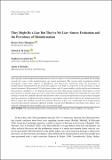| dc.contributor.author | Swire‐Thompson, Briony | |
| dc.contributor.author | Ecker, Ullrich K. H. | |
| dc.contributor.author | Lewandowsky, Stephan | |
| dc.contributor.author | Berinsky, Adam J. | |
| dc.contributor.author | Berinsky, Adam | |
| dc.date.accessioned | 2020-08-26T15:55:07Z | |
| dc.date.available | 2020-08-26T15:55:07Z | |
| dc.date.issued | 2019-01 | |
| dc.identifier.issn | 0162-895X | |
| dc.identifier.issn | 1467-9221 | |
| dc.identifier.uri | https://hdl.handle.net/1721.1/126821 | |
| dc.description.abstract | Even if people acknowledge that misinformation is incorrect after a correction has been presented, their feelings towards the source of the misinformation can remain unchanged. The current study investigated whether participants reduce their support of Republican and Democratic politicians when the prevalence of misinformation disseminated by the politicians appears to be high in comparison to the prevalence of their factual statements. We presented U.S. participants either with (1) equal numbers of false and factual statements from political candidates or (2) disproportionately more false than factual statements. Participants received fact-checks as to whether items were true or false, then rerated both their belief in the statements as well as their feelings towards the candidate. Results indicated that when corrected misinformation was presented alongside equal presentations of affirmed factual statements, participants reduced their belief in the misinformation but did not reduce their feelings towards the politician. However, if there was considerably more misinformation retracted than factual statements affirmed, feelings towards both Republican and Democratic figures were reduced—although the observed effect size was extremely small. | en_US |
| dc.language.iso | en | |
| dc.publisher | Wiley | en_US |
| dc.relation.isversionof | http://dx.doi.org/10.1111/pops.12586 | en_US |
| dc.rights | Creative Commons Attribution-Noncommercial-Share Alike | en_US |
| dc.rights.uri | http://creativecommons.org/licenses/by-nc-sa/4.0/ | en_US |
| dc.source | Other repository | en_US |
| dc.title | They Might Be a Liar But They’re My Liar: Source Evaluation and the Prevalence of Misinformation | en_US |
| dc.type | Article | en_US |
| dc.identifier.citation | Swire‐Thompson, Briony et al. "They Might Be a Liar But They’re My Liar: Source Evaluation and the Prevalence of Misinformation." Political Psychology 41, 1 (April 2019): 21-34 © 2019 International Society of Political Psychology | en_US |
| dc.contributor.department | Massachusetts Institute of Technology. Department of Political Science | en_US |
| dc.relation.journal | Political Psychology | en_US |
| dc.eprint.version | Author's final manuscript | en_US |
| dc.type.uri | http://purl.org/eprint/type/JournalArticle | en_US |
| eprint.status | http://purl.org/eprint/status/PeerReviewed | en_US |
| dc.date.updated | 2020-06-04T19:25:35Z | |
| dspace.date.submission | 2020-06-04T19:25:37Z | |
| mit.journal.volume | 41 | en_US |
| mit.journal.issue | 1 | en_US |
| mit.license | OPEN_ACCESS_POLICY | |
| mit.metadata.status | Complete | |
